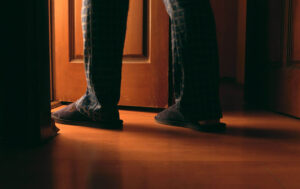 Frequent urination at night, known as nocturia, is a common issue among elderly individuals. This condition can disrupt sleep and significantly impact overall health and quality of life. Understanding its causes, symptoms, and management strategies is key to improving nighttime comfort and maintaining well-being.
Frequent urination at night, known as nocturia, is a common issue among elderly individuals. This condition can disrupt sleep and significantly impact overall health and quality of life. Understanding its causes, symptoms, and management strategies is key to improving nighttime comfort and maintaining well-being.
What Is Nocturia?
Nocturia refers to the need to wake up multiple times during the night to urinate. While it can happen to anyone occasionally, it becomes a concern when it occurs frequently and interrupts sleep regularly. Unlike bedwetting or nighttime accidents, individuals with nocturia fully wake up to use the bathroom, leading to poor sleep quality.
What Causes Nocturia in Elderly People?
A variety of factors contribute to nocturia in seniors, including:
- Age-Related Changes: The bladder’s capacity decreases with age, and kidneys may produce more urine at night.
- Medical Conditions: Chronic conditions like diabetes, heart failure, kidney disease, or sleep apnea can increase nighttime urination.
- Medications: Diuretics or other drugs for high blood pressure or heart conditions may promote fluid excretion.
- Prostate Issues: In men, an enlarged prostate (benign prostatic hyperplasia) can lead to frequent urination.
- Hormonal Changes: Reduced levels of antidiuretic hormone (ADH), which helps retain fluid, cause more urine production during the night.
- Fluid Intake: Drinking large amounts of fluids, particularly caffeine or alcohol, in the evening can contribute to nocturia.
Nocturia Symptoms and Diagnosis
Common symptoms of nocturia include waking up two or more times during the night to urinate, fatigue from disrupted sleep, and excessive thirst at night. Diagnosis often involves a physical exam, urine tests, or tracking your fluid intake and bathroom trips through a bladder diary.
Tips to Manage Nocturia for Better Sleep
- Limit Evening Fluids: Reduce fluid intake 2-3 hours before bed, especially caffeine and alcohol.
- Elevate Your Legs: During the day, elevate your legs to help reduce fluid buildup that can lead to nighttime urination.
- Empty Your Bladder Before Bed: Make a habit of using the bathroom just before sleeping.
- Adjust Medications: Talk to your doctor about the timing of medications that affect fluid levels.
- Create a Comfortable Environment: Use nightlights to make trips to the bathroom safer and less disruptive.
Final Thoughts
Nocturia is a frustrating condition for many elderly individuals, but understanding its causes and taking proactive steps can improve sleep and overall health. If frequent urination at night is affecting your life, consult a healthcare professional to explore treatment options tailored to your needs.
